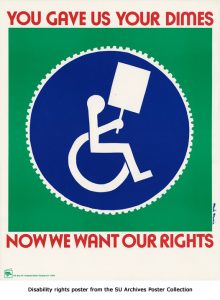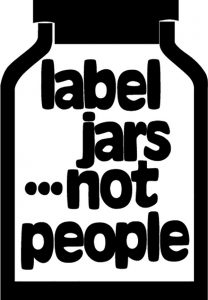Disability Studies at Syracuse University builds on the School of Education’s groundbreaking work in the area of disability.
Our programs are designed to help students examine disability as a social phenomenon, social construct, metaphor, identity, and culture. Consistent with the Syracuse tradition, we stand at the forefront of the development of the theoretical, research, educational, and advocacy models necessary to remove the social, legal, physical, policy, and attitudinal barriers that exclude people with disabilities.
Disability Studies is a vibrant area of academic inquiry. Our philosophy is based on these principles:
 Since the early 1970s, Syracuse University programs and centers have been involved in research, training, and advocacy efforts in the area of disability. Faculty and students in the School of Education have examined media portrayals and cultural stereotypes of people with disabilities, institutional abuse, the social construction of mental retardation, the history of mental retardation, public policy and developmental disabilities, school inclusion, and the experiences of people with disabilities and their families in the community. Much of the research at Syracuse has been based on qualitative or ethnographic research methods, and faculty have helped to popularize this research approach in education and human services.
Since the early 1970s, Syracuse University programs and centers have been involved in research, training, and advocacy efforts in the area of disability. Faculty and students in the School of Education have examined media portrayals and cultural stereotypes of people with disabilities, institutional abuse, the social construction of mental retardation, the history of mental retardation, public policy and developmental disabilities, school inclusion, and the experiences of people with disabilities and their families in the community. Much of the research at Syracuse has been based on qualitative or ethnographic research methods, and faculty have helped to popularize this research approach in education and human services.

Founded by the late Burton Blatt, the Center on Human Policy at Syracuse emerged in the 1970s as one of the nation’s leading policy institutes on disability. In addition to research and training, the Center has played a leadership role in the movement to insure people with disabilities with their rightful place in the community. The Center advocated for deinstitutionalization, accessibility, school inclusion, parents’ rights, and self-advocacy long before these became popular trends in the field of disability.
In 1994, teacher training programs in special education merged with the School of Education’s Teaching & Leadership to promote the preparation of teachers competent to educate students in inclusive schools. Faculty associated with the sociology of disability and public policy became part of Cultural Foundations of Education, and disability studies was established at the graduate level.
Disability Studies refers generally to the examination of disability as a social, cultural, and political phenomenon. In contrast to clinical, medical, or therapeutic perspectives on disability, Disability Studies focuses on how disability is defined and represented in society. It rejects the perception of disability as a functional impairment that limits a person’s activities. From this perspective, disability is not a characteristic that exists in the person or a problem of the person that must be “fixed” or “cured.” Instead, disability is a construct that finds its meaning within a social and cultural context.
Defining what Disability Studies is may also be informed by what it is not. It is not medicine, rehabilitation, special education, physical or occupational therapy, and professions oriented toward the cure, prevention, or treatment of disabilities. Although Disability Studies scholars generally subscribe to the minority group model of disability — the view that the status of people as a minority shapes their experiences in society — they agree on little else. For example, some Disability Studies scholars view disability in terms of culture and identity, while others see disability as a label and a social construct.
Some Disability Studies Scholars use different language to refer to the people at the center of inquiry in Disability Studies. Disabled person is used to draw attention to the centrality of disability in individual identity; person with a disability or “people first language” conveys the idea that having a disability is secondary to a person’s identity as a human being; person labeled as disabled (mentally retarded, mentally ill, and so on) focuses on how disability is a socially constructed definition imposed on people who may or may not agree to this characterization. A deaf person and Deaf person mean very different things, with the latter emphasizing membership in a culture defined linguistically.
Disability Studies challenges the way in which disability is constructed in society. It also involves the development of the theoretical, research, educational, and advocacy models necessary to remove the legal, physical, policy, and attitudinal barriers that exclude people with disabilities from society. Disability Studies, therefore, has the potential to benefit people with disabilities as well as society by the participation and presence of people with disabilities in our schools, our neighborhoods, our workplaces, and in our lives.
